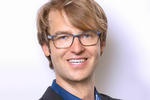Elite program for postdocs
Direktzugriff
Artikelaktionen
Phoro: Frederik Kotz
Freiburg, Dec 01, 2020
For young scientists the phase between PhD and becoming a professor is a major challenge: in order to teach at a university they have to demonstrate not only outstanding research and publications but also extensive experience in teaching, research management, plus academic autonomy. In 2020 the Baden-Württemberg Stiftung is funding three researchers from the University of Freiburg on their elite program for postdocs: Dr. Sarah May from the Institute of Cultural Anthropology and European Ethnology, Dr. Frederik Kotz from Department of Microsystems Engineering (IMTEK) and Dr. Lukas Bruder from Institute of Physics. The Baden-Württemberg Stiftung’s program supports outstanding researchers on their path to becoming a professor by funding them to conduct research projects commissioned and managed on their own responsibility with up to 150,000 euros over a maximum of three years. In the 2020 round of 55 applications fourteen applicants were selected. In total all the successful applications together receive about 1.7 million euros.
Frederik Kotz, Department of Microsystems Engineering (IMTEK): ‘Hochaufgelöster 3D Druck bioaktiver Gläser’ [High-resolution 3D printing of bioactive glasses]
Period: April 2021 to March 2024, grant: 139,000 euros
Bioactive glasses are among the most-promising materials for regenerative medicine: when in contact with biological liquids – for example from intercellular space – they form a layer of hydroxycarbonate which can bond with tissue – for example bone tissue. Three-dimensional shaping of such bioactive glasses is vitally important to producing implants that fit perfectly as well as to create frameworks on which cells can be cultivated and stem cell research carried out. Microsystems engineer Frederik Kotz is developing new materials for high-resolution 3D printing which can be used to create micrometer-scale structures in bioactive glass, production of which was hardly possible until now.
Sarah May, Institute of Cultural Anthropology and European Ethnology: ‘Bioökonomie als kulturelle Transformation. Innovative Potenziale und gesellschaftliche Herausforderungen der Praktiken zukunftsorientierten Wirtschaftens’ [Bioeconomics as cultural transformation. Innovative potential and social challenges of forward-looking economic practices]
Period: May 2021 to April 2024, grant: 139,000 euros.
Technical innovations and political programs often arise in response to global crises. For instance, as fossil resources are becoming increasingly scarce, the concept of bioeconomics offers an alternative approach whereby sustainable economic growth can be achieved with the aid of renewable resources. Using ethnographic methods for the project, cultural anthropologist Sarah May and her team are researching the practices, partnerships, motives and values of local pioneers who develop real-life bioeconomic solutions such as packaging made of plant material or clothing made of cellulose. They aim to show that these practices are complex cultural processes that are also ambivalent and conflictual. In addition they want to reveal the transformation processes that arise from such bioeconomic efforts.
Lukas Bruder, Institute of Physics: ‘Eine neue Art der Photoelektronenspektroskopie mit hoher Frequenz-Zeit-Auflösung’ [A new kind of photoelectron spectroscopy with high frequency-time-resolution]
Period: June 2021 to May 2024, grant: 137,000 euros
On the microscopic level, nature is driven by fundamental molecular processes. These processes can be very complex and fast, making their investigation a difficult task. One established method for studying molecular systems is photoelectron spectroscopy. There are two variants: high-resolution and time-resolved photoelectron spectroscopy. The first provides particularly detailed information about the energy states and structure of molecules, the second enables tracing molecular processes in real time. Until now researchers have had to choose between the two options when designing an experiment. Physicist Lukas Bruder is developing a new method that allows switching between the two options continuously within the same experiment. In this way, researchers can adapt an experiment optimally to the time scales and energy structures of the molecules and thus obtain maximum information. Developed in Freiburg, the experimental concept will be tested in large-scale research facilities in Europe.
The Baden-Württemberg Stiftung gGmbH was founded in 2000 as the Landesstiftung Baden-Württemberg based in Stuttgart. It aims to pave the way for cutting-edge research and ensure diverse training methods and responsible dealings between people. The Baden-Württemberg Stiftung is one of Germany’s major foundations.
Contact:
Dr. Frederik Kotz
Department of Microsystems Engineering (IMTEK)
Faculty of Engineering
University of Freiburg
Tel. +49 761 203 7355
frederik.kotz(at)neptunlab.org
Dr. Sarah May
Institute of Cultural Anthropology and European Ethnology
Faculty of Humanities
University of Freiburg
Tel. +49 761 203 97623
sarah.may(at)kaee.uni-freiburg.de
Dr. Lukas BruderInstitute of PhysicsFaculty of Mathematics and PhysicsUniversity of FreiburgTel. +49 761 203 8405lukas.bruder@physik.uni-freiburg.de
Fußzeile
Benutzerspezifische Werkzeuge

